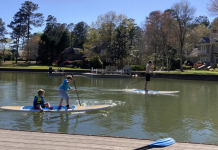 As our kids start closing in on high school graduation, we ask ourselves if our kids are ready for life after graduation. For some kids that will mean going away for college. Other kids will be living at home while going to school. And some will be starting a job, jumping directly into the career world. Regardless of which path they are choose, there are some tools they will all need to navigate the early years of adulthood (yes I said it, adulthood).
As our kids start closing in on high school graduation, we ask ourselves if our kids are ready for life after graduation. For some kids that will mean going away for college. Other kids will be living at home while going to school. And some will be starting a job, jumping directly into the career world. Regardless of which path they are choose, there are some tools they will all need to navigate the early years of adulthood (yes I said it, adulthood).
First of all, let me start by saying I do not have any kids in college. My oldest is about to be a high school junior. But the majority of my nieces and nephews are older than my kids. Thanks to church and community, I have a number of friends whose kids are already in college or beyond. I also worked in higher education for 14 years, so I have interacted with a lot of college students. Since I have been observing young adults for some time, I wanted to share some basic tools our kids will need for the start of adulthood.
Banking
Help your child open a bank account as soon as possible. Banking is a lot like driving, the more time your child has banking while under your supervision, the better! Our credit union has a great student account that is available at the age of 16. (You can even customize their app to have UAB Blazer colors.)
If your child is not 16 yet, go ahead and set them up with a Cash App card, or something similar. Cash App lets kids as young as 13 years old get an account and debit card under their parents’ supervision on a family account. Regardless of their age, talk to your kids about good banking practices and budgeting. Teach your kids how to write a check, complete a purchase, deposit a check electronically, and how to find out their information for direct deposit.
Experiencing Authority Figures
Give your child opportunities to be under the authority of someone other than yourself. Traditional teachers, co-op teachers, coaches, directors, bosses, section leaders, and team captains are all great examples. Talk about those experiences with them. Talk about humility, submission, and standing up when it comes to non-negotiable things. Don’t undermine those authorities unless it is important!
The reality of life is that we all sit under the authority of someone else, like bosses or thsoe who enforce city building codes. And some of those authorities are jerks or fools. Help your child learn how to efficiently operate under authority before their paycheck is on the line.
Car Maintenance and Trouble
My dad taught me the basic theory of changing oil and a tire. But, to be completely honest, I certainly couldn’t do it in real life. However, my dad also taught me the value of knowing a few good mechanic shops and following good car maintenance. One of my bosses taught me the value of having roadside assistance. (I love AAA!) Teach your kids how to get an oil change, and who to call if they have car trouble.
Consequences and Problem Solving
As much as appropriate, don’t save your child from the consequences of their choices. Do this while they are young and the consequences are not life altering. This will help your child learn to take responsibility for themselves and find solutions to the challenges of life. This will also help them develop confidence. Struggling and overcoming challenges shows your kids their ability to handle future challenges.
For example, I no longer pack for my kids when we go on trips. (My youngest is a rising 4th grader and I previously taught them how to pack.) On our last trip, my youngest discovered two days in that he didn’t pack enough socks. I asked him what he should do. He decided to wash the ones he had packed during the trip. So with my help, since he is too short to reach inside the stacked dryer, that is what he did. Now he knows to pack more socks, and he got practice creating and executing a plan to deal with his problem.
In the grand scheme of things, forgetting socks is no big deal. It would have been easier for me to deal with the problem without his input (hello Walmart Pick Up). But I am banking on lots of little experiences over time to build up his ability to understand choices and rise to challenges.
There are definitely times when we must intervene. Even in those times, we can include them in the process, so they have the opportunity to learn.











